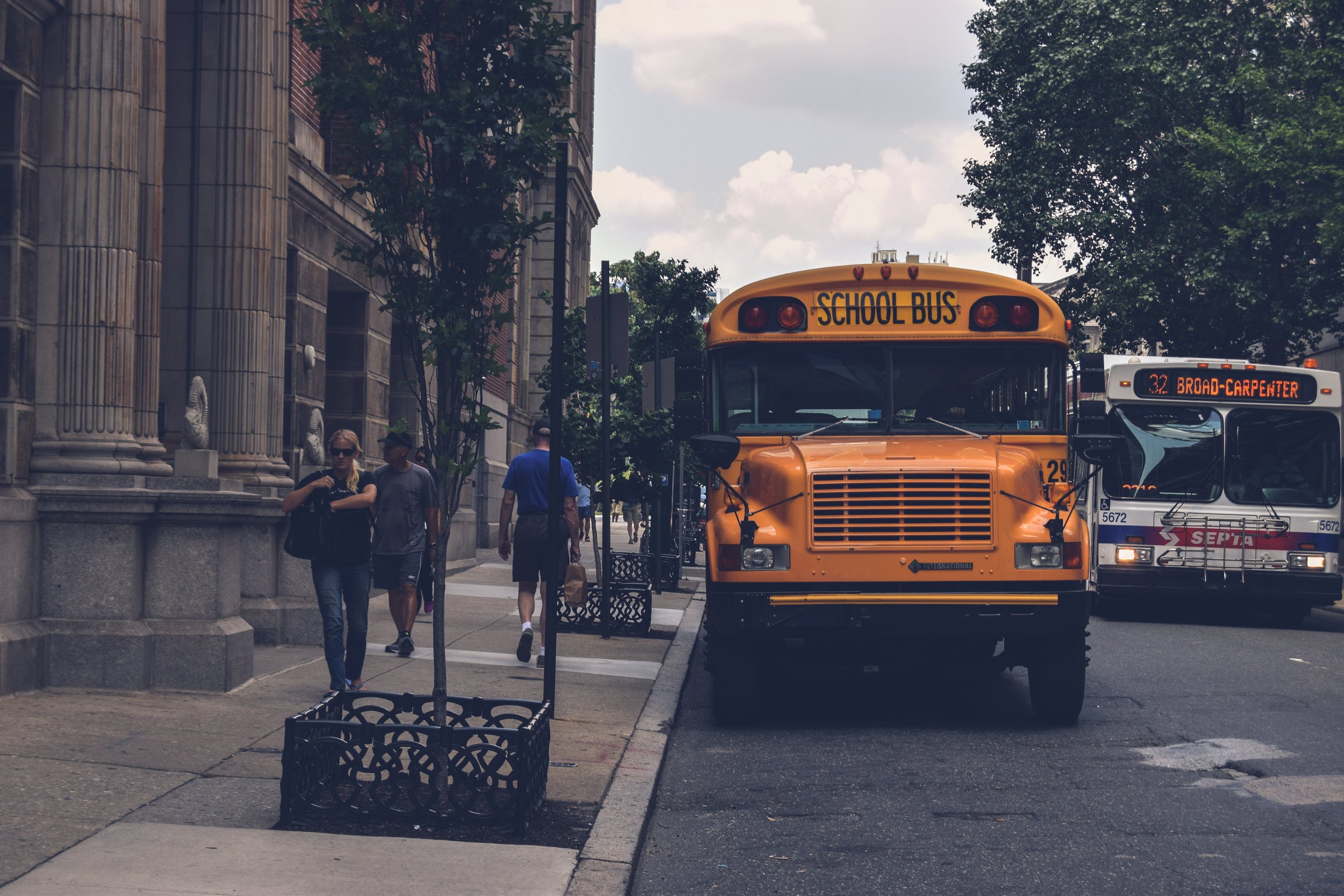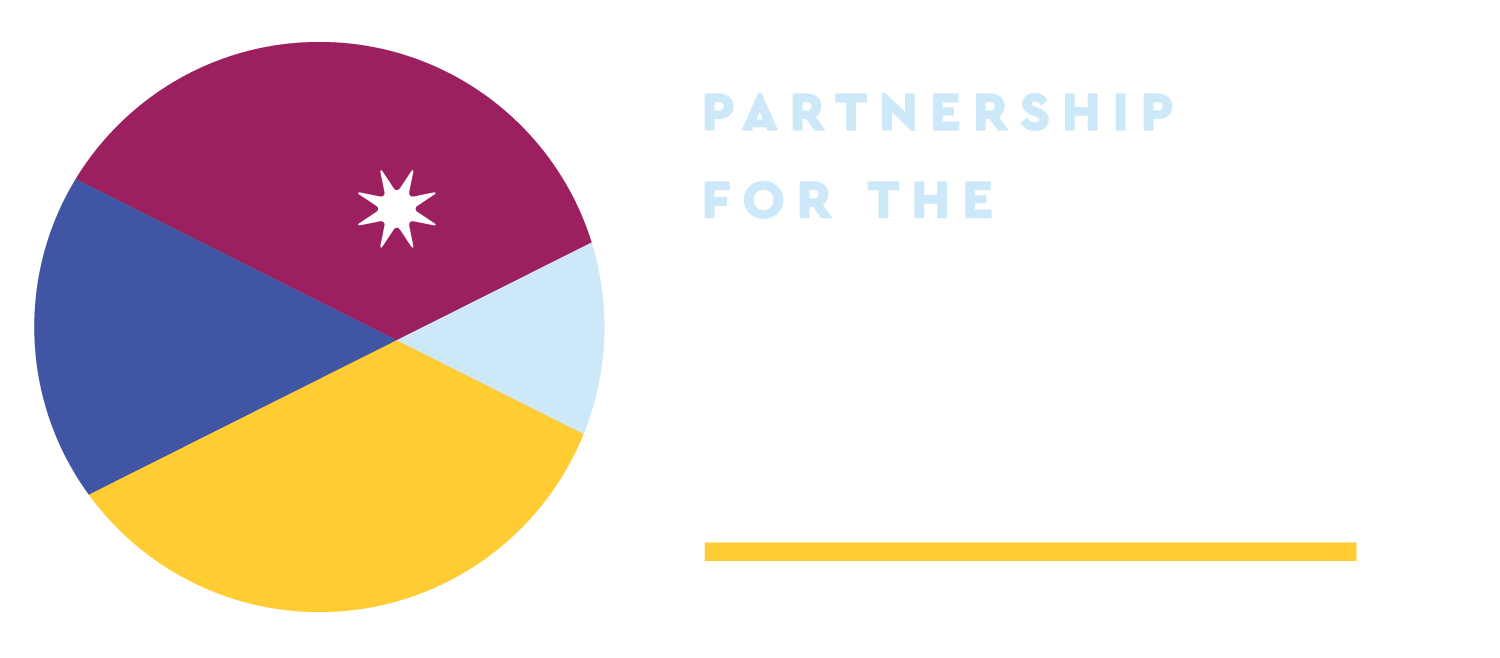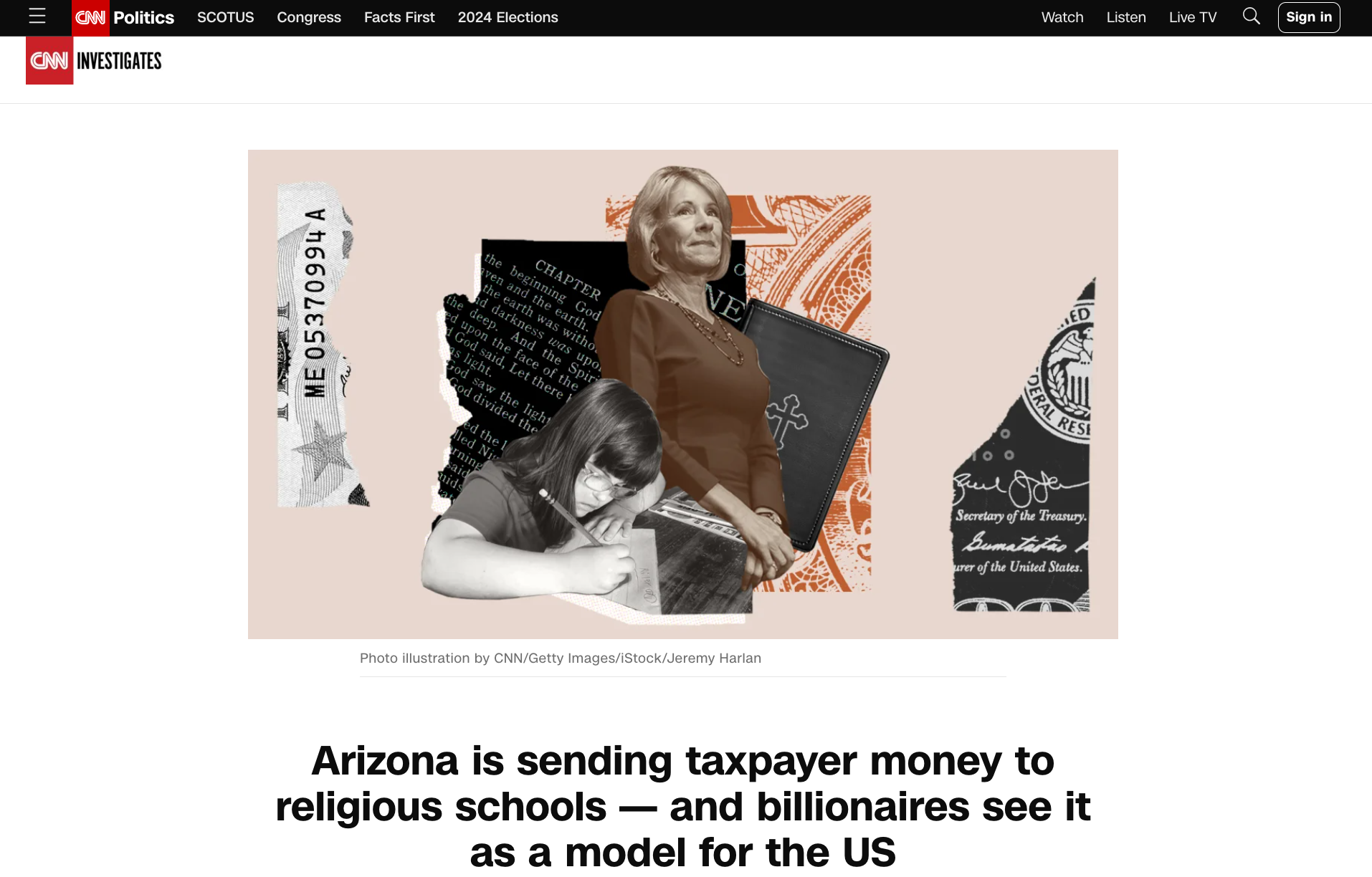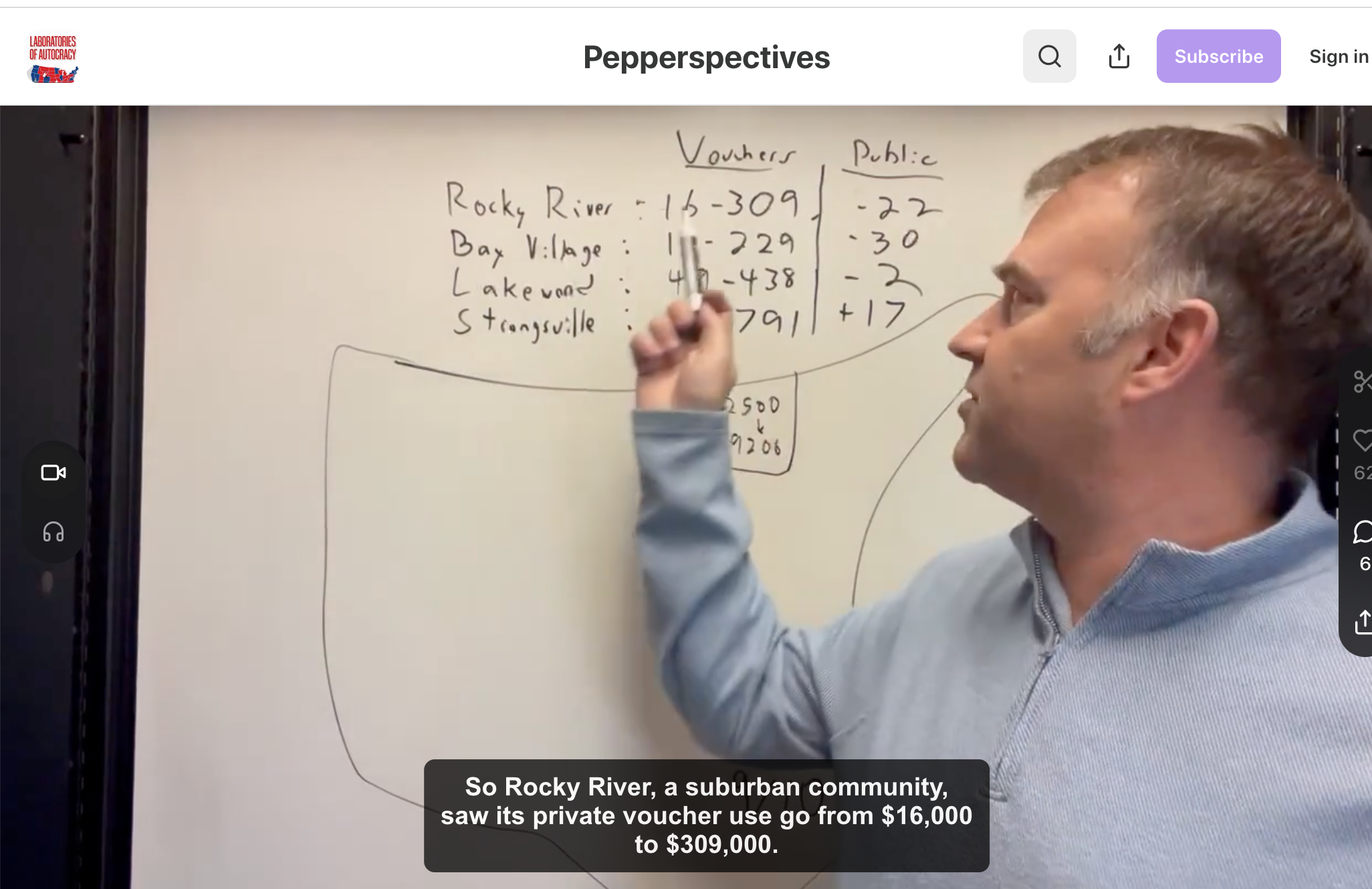
INSIGHT
Voucher programs undermine public education.
There is a concerted effort to defund and dismantle public education, which serves the majority of the nation’s students and is a critical foundation of our democracy. Challenges include political attacks against students of color and LGBTQ+ students, targeting inclusive curricula and full and accurate histories, and banning books.
The push for school voucher programs feeds these other controversies, which in turn are used to create “demand” for privatization.
Since Arizona passed its universal voucher bill in 2022, eight more states have followed suit: Florida, Ohio, North Carolina and Indiana expanded existing voucher programs. Arkansas, Alabama, Iowa and Utah joined West Virginia, whose Hope scholarship program began in 2021, in creating new programs set to become universal. Clark’s Love Your School AZ has expanded to Alabama and West Virginia, and Clark has started a series of related groups to bolster the national ecosystem supporting school vouchers. She’s also become one of the movement’s key messengers, aided by the prestige of an appointment to the Arizona board of education, and the most visible antagonist of the state’s public school advocates.
Eleven states now have universal school voucher laws, with the harm falling especially hard on rural schools. Twenty-nine states and the District of Columbia have at least one private school choice program. In November 2023, when Politico tweeted out its story, “GOP states are embracing vouchers. Wealthy parents are benefitting.,” Corey DeAngelis, DeVos’s privatization point man, responded, “Fantastic.”
They strategized over PASS, the state program that would provide vouchers to students in the lowest-performing public schools. “I needed to get Yass’s feedback,” Williams says of the program’s political viability, “because he is more in contact with Republicans than I am.
A new bill in the Pennsylvania Senate is a sort of super-voucher stripped of any pretense, because it simply pays parents to pull their child out of public school.
Drive an hour south of Nashville into the rolling countryside of Marshall County, Tennessee — past horse farms, mobile homes and McMansions — and you will arrive in Chapel Hill, population 1,796. It’s the birthplace of Confederate Gen. Nathan Bedford Forrest, who helped found the Ku Klux Klan. And it’s the home of Todd Warner, one of the most unlikely and important defenders of America’s besieged public schools.
The parenting bubble for anti-public ed activism is really expanding.
Jeanne Allen's Center for Education Reform has just rolled out the Parent Power Index! It assigns arbitrary values measures three vaguely defined qualities-- choice programs, charter schools, and innovation-- and gives each state a letter grade. There's nothing new being quantified here, just the same old anti-public school, anti-union wine in new parentified wineskins
Across the US, right-wing state legislatures have disregarded popular will to enact costly school privatization plans. In North Carolina, they flouted democracy to advance their agenda.
School superintendents typically don’t air their political grievances in public. They prefer to work behind-the-scenes with lobbyists on issues that affect their schools. But the superintendent of a prominent Arizona district is not holding back.
A CNN investigation found that the program has cost hundreds of millions of dollars more than anticipated, disproportionately benefited richer areas, and funneled taxpayer funds to unregulated private schools that don’t face the same educational standards and antidiscrimination protections that public schools do. Since Arizona’s expanded program took effect in 2022, according to state data, it has sent nearly $2 million to Dream City and likely sapped millions of dollars from Paradise Valley’s budget.
In 2023, North Carolina lawmakers went all-in on vouchers. Via changes incorporated in the 2023 budget bill, North Carolina became the tenth state with a universal voucher program, one in which all private school students are eligible for state-funded subsidies regardless of their family income.
FRANKFORT, Ky. (AP) — Supporters of letting Kentucky voters decide the outcome of a school choice constitutional amendment cleared a key hurdle Wednesday when the state House gave its support, after a tense debate that could foreshadow a bruising campaign ahead if the proposal reaches the ballot.
The original narrative (ie. sales pitch) was that private school vouchers were intended to assist kids in poverty and in struggling urban public schools in gaining access to “better” private schools.
And in many places, that’s how it was designed. At the very beginning.
And then…they got rid of all the criteria that served that stated goal.
Proposed private school voucher expansions divert even more money from an already underfunded public school system, and fail to address severe teacher shortages.
North Carolina public schools face severe teacher and staff shortages, especially in rural areas, and the state ranks dead last or near last in several national categories charting public education spending.
The 2022-23 PPS Impact Report celebrates PPS’s continued commitment to advancing the role of families and communities in securing a high-quality public education for every child. The report also includes PPS’s statement in opposition to vouchers and work with other statewide advocacy groups against vouchers.
Voucher plans are sweeping the country, transferring public funds to private schools. Many Illinois residents don't realize we have a voucher program right here in the form of a tax credit "scholarship" program, known as Invest in Kids.
Our expert panel looks at this national trend, examines the research on student achievement in voucher schools, gives a glimpse of the impact of vouchers on students in our neighboring state of Indiana, and presents important information about Invest in Kids.
Network 49 hosts a presentation from IL Families for Public Schools' Diane Horwitz and Cassie Creswell talking about the voucher program in Illinois, Invest in Kids.
Illinois Families for Public Schools is calling for the Invest in Kids program to end permanently, along with more than 50 other state and local organizations. Vouchers harm the public good in a variety of ways: they violate the fundamental principle of the separation of church and state. They divert public dollars from our already underfunded Illinois public schools. Research shows that they do not improve academic outcomes for children who receive vouchers. And we know that voucher schools in Illinois are discriminating on the basis of religion, disability status, LGBTQ+ status and more---that's not what education equity looks like!
This report from the Education Law Center and the Southern Poverty Law Center illustrates that while southern states are failing to adequately fund their public schools, almost all of them are funneling scarce education funding to private schools through voucher programs and otherwise engaging in “culture wars” that seek to undermine public education.


















